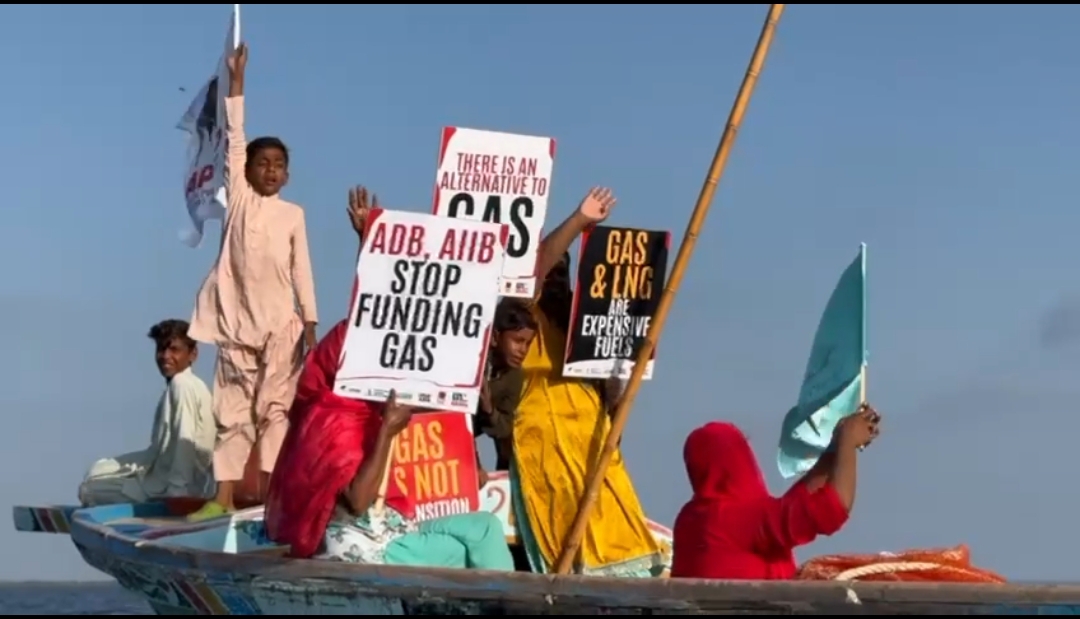Business
Boat Protests Demand Halt to Fossil Gas Expansion as COP29 Approaches


Fisherfolk rally against fossil gas expansion from Jamot Jetty in Karachi, urging world leaders to prioritize renewable energy and climate justice ahead of COP29.
Karachi, October 7, 2024: Hundreds of fisherfolk, both women and men, took part in a dramatic boat protest on Thursday, November 7, sailing from Jamot Jetty in Ibrahim Hydri as part of the “Global Days of Action Against Gas Expansion” in the lead-up to the 2024 UN Climate Change Conference (COP29) in Baku, Azerbaijan.
The boat protests, held in coastal regions of Pakistan, India, Bangladesh, Indonesia, and the Philippines, were organized by the Asian People’s Movement for Debt and Development (APMDD). The demonstrations sought to send a strong message to world leaders attending COP29 regarding the dangers posed to communities and the planet by massive investments in fossil gas.
Saeed Baloch, General Secretary of Pakistan Fisherfolk Forum, stated: “We from the Global South are united in making this call ahead of COP29. Continued investments in fossil gas endanger both people and the planet, which is in direct contradiction to the pledge made by governments at COP28 to transition away from fossil fuels. World leaders must not ignore the undeniable health, environmental, and social impacts of fossil gas, and must honor their commitments to decarbonize, deliver climate finance, and invest in renewable energy that serves humanity.”
The protest, which featured small, artisanal fishing boats—a representation of the traditional livelihoods of the fishing communities—was set against the backdrop of large gas plants and liquefied natural gas (LNG) facilities, highlighting the contrast between fossil fuel infrastructure and the future of renewable energy.
Baloch added: “It’s alarming that wealthy nations and large transnational banks continue to finance fossil gas expansion in Asia, Africa, and Latin America. We reject the dependence on fossil fuels and demand real, accountable commitments from these powers to directly support the transition to renewable energy systems. Every dollar spent on fossil gas should instead be invested in solar and wind energy—renewables that can meet our energy needs without leading us into ecological collapse. Gas is not a bridge fuel; it is a future disaster.”
Qazi Khezer, Vice Chairperson of the Human Rights Commission of Pakistan, also spoke out against fossil gas expansion, emphasizing the severe health risks posed to communities. “Fossil gas expansion is a grave health risk and an environmental threat,” Khezer said. “It causes respiratory and cardiovascular diseases, particularly in children and the elderly. Choosing gas is choosing a future where no one breathes clean air.”Fatima Majeed, Senior Vice Chairperson of Pakistan Fisherfolk Forum, emphasized the global ramifications of continued fossil gas investments. “Fossil gas expansion in Asia undermines the global climate goals and makes it nearly impossible to achieve the 1.5°C target of the Paris Agreement. The people of Pakistan are already facing the deadly impacts of the climate crisis, including displacement and health risks. If this continues, future generations will bear an unbearable cost,” she warned.
Protesters held placards bearing messages such as “Don’t Gas Asia,” “End Fossil Fuels,” and “Gas Is Not a Transition Fuel—Shift Directly to RE,” advocating for the following demands:
A moratorium on new fossil fuel projects, including new public and private finance, approvals, licenses, permits, or extensions.
A rapid, just, and equitable phase-out of existing fossil fuel infrastructure in line with the 1.5°C temperature limit, and a global plan to ensure that each country contributes its fair share.
Increased international cooperation to scale up climate finance and technology transfers, ensuring renewable energy access and supporting Just Transition processes.
An end to greenwashing and false solutions like carbon offsets, CCS, or geoengineering.
Holding polluters accountable for the damage they have caused and ensuring that coal, oil, and gas corporations pay reparations for climate loss, damage, and local rehabilitation.
Ending corporate capture of climate action processes and preventing corporations from writing the rules of climate policy or undermining global climate efforts.
Business
An AI started ‘tasting’ colours and shapes. That is more human than you might think

The brain often blurs the senses – a fact that marketers often use in the design of food packaging. And AIs appear to do the same.
What is the flavour of a pink sphere? And what is the sound of a Sauvignon Blanc?
Such questions may sound ridiculous, but a huge body of literature shows us that the human brain naturally merges sensory experiences. We may not be conscious of the phenomenon, but we associate different colours, shapes and sounds with different flavours in ways that can subtly shape our perceptual experience, for example.
The colour of our glass, or music playing in the background of a bar, can determine how sweet or musky a wine tastes, for instance. “This cross talk between the senses is happening almost on an ongoing basis all the time,” explains Carlos Velasco at the BI Norwegian Business School in Oslo, Norway. In extreme cases it can manifest in a blurred sensory experience for some people where words might trigger specific tastes or music produces a riot of colour – something known as synaesthesia.
And while the idea that you can “taste” a colour or sound may seem absurd enough, Velasco’s latest research suggests that generative artificial intelligence systems may also do this too. As with all AI algorithms, this is largely a reflection of biases in the data they were trained on, so they are perhaps just highlighting how common these associations may actually be. But Velasco and his colleagues hope to use this fact to find many other ways to hack human senses.
Business
Car industry consulted over 2030 petrol and diesel ban

The UK motor industry is being consulted over how the phasing-out of new petrol and diesel cars by 2030 will work, the government has announced.
The ban on sales of these vehicles had been extended to 2035 under the previous Conservative government but Labour said it would restore the 2030 deadline in its election manifesto.
Transport Secretary Heidi Alexander is now seeking views from automotive and charging experts to “restore clarity” on how to deliver the ban.
Car industry leaders have warned drivers were not switching to electric vehicles at the rate needed to meet the deadline due to the cost of buying the cars privately and charging point infrastructure.
Business
Cadbury loses royal warrant after 170 years

Chocolate maker Cadbury has been dropped from the list of royal warrants for the first time in 170 years.
The Birmingham-based chocolatier was awarded its first royal warrant as chocolate and cocoa manufacturers by Queen Victoria in 1854, but it has lost its royal endorsement under King Charles.
Cadbury’s US owners, Mondelez International, said it was disappointed to have been stripped of its warrant.
The King has granted royal warrants to 386 companies that previously held warrants from Queen Elizabeth II, including John Lewis, Heinz and Nestle.
-

 Entertainment4 months ago
Entertainment4 months agoEarthquake scientists are learning warning signs of ‘The Big One.’ When should they tell the public?
-

 International4 months ago
International4 months agoTarar accuses Imran Khan of conspiring with Faiz Hameed to destabilise Pakistan
-

 International2 months ago
International2 months agoPTI Announces Not to Boycott New Committees
-

 Business3 months ago
Business3 months agoMajor Corruption Scandal Uncovered at WASA Multan: Rs1.5 Billion Embezzlement Exposed
-

 Business4 months ago
Business4 months agoThe Impact of QR Codes on Traditional Advertising
-

 Business4 months ago
Business4 months agoThe Benefits and Problems of International Trade in the Context of Global Crisis
-

 Business4 months ago
Business4 months agoFraud by Pakistani Firm Sparks Outrage in Business Community; Concerns Rise Over International Investment
-

 Business2 months ago
Business2 months agoHigh Court Blocks MDCAT Merit List Amid Controversy Over Exam Error






